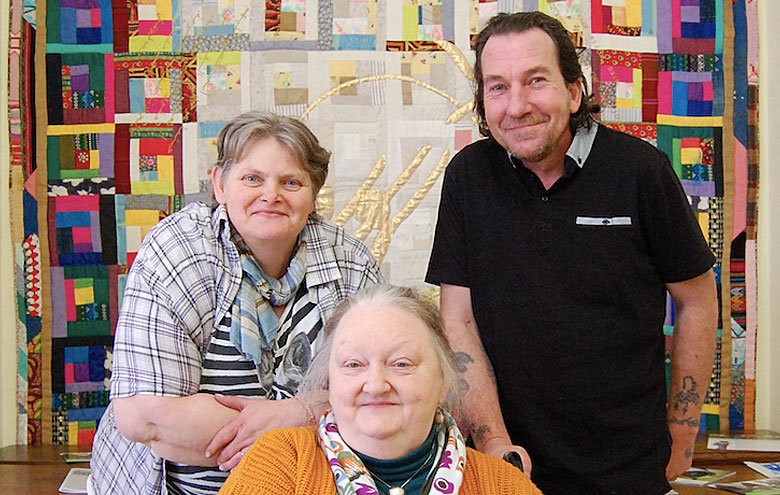
From left: Amanda Button, Moraene Roberts, and Thomas Mayes
In March, 2019, three ATD Fourth World members talked about how their experience of poverty forged their roles as activists. Below they describe why they value ATD’s approach, and what they see as key steps forward. Sadly, Moraene Roberts passed away in January, 2020. Her memory continues to inspire all who knew her.
Moraene Roberts: The first step, before becoming an activist, is recognising yourself as part of a community in poverty, part of the ATD Fourth World community. When I first came here, I didn’t think of myself as being “in poverty”. But here, I met lots of other people who were going through the same situations I was. We had things in common.
That made me think that certain aspects of my situation were my own responsibility because of choices I’d made, while other aspects came from what had been imposed on me.
I began to recognise the fact that poverty is created.
Before, I thought that poverty was normal because so much was completely out of my control.
Amanda Button: As activists, we’re proud of the ethos that ATD Fourth World has had until now. “The Roles We Play” was a strong project because it gave each person a sense of pride. It gave us ownership and control over our own portrayal. It has also been a tool for opening doors at universities and other organisations where we can meet people who have goals in common with ours. During skill-sharing weekends, people with different levels of strength can help one another. We’re complementary.
Our public voice is strengthened when we come together with others. You feel honoured in your soul.
ATD Fourth World core workers* believe that we try our best. Here, I was asked to help send out mailings. That gave me a sense of purpose. And I meet people of so many different cultures and levels of education — that opens things up, getting to know different people.
Thomas Mayes: We give each other little nudges here and there. And that turns into training. It can help you learn how to talk in front of someone hostile who doesn’t agree with you. That training is a crucial aspect of freeing people from poverty.
Whether we have personal experience of living in poverty or not, all members of ATD Fourth World have things to learn.
So cooperative training and skill-sharing with one another needs to be a bigger part of our work.
Moraene Roberts: ATD Fourth World’s strengths are the solidarity among all of us and the legacy we inherited. It’s our duty to continue and to develop this legacy, and also to develop our personal confidence and autonomy. We also see opportunities in the wider network with other organisations where activists are now involved outside of ATD Fourth World. We’re a “family of choice” because we work and think together. It’s not top-down.
Another important part about ATD Fourth World is that we really get to know people from different backgrounds and levels of education.
I was brought up to believe that the rich just don’t care. But here I’ve met some seriously wealthy people who do care about ending poverty. Our struggle is not a class struggle; it’s a struggle for human rights.
As activists, we don’t want to speak only about what it’s like to be in poverty, but about what causes poverty, about possible solutions, and about the benefits to everyone of creating a poverty-free society
*Members of ATD’s full-time Volunteer Corps. Learn more about this opportunity to work alongside people who live in deep poverty around the world.
More on ATD Fourth World in the UK
More on ATD Fourth World activists with lived experience of poverty
